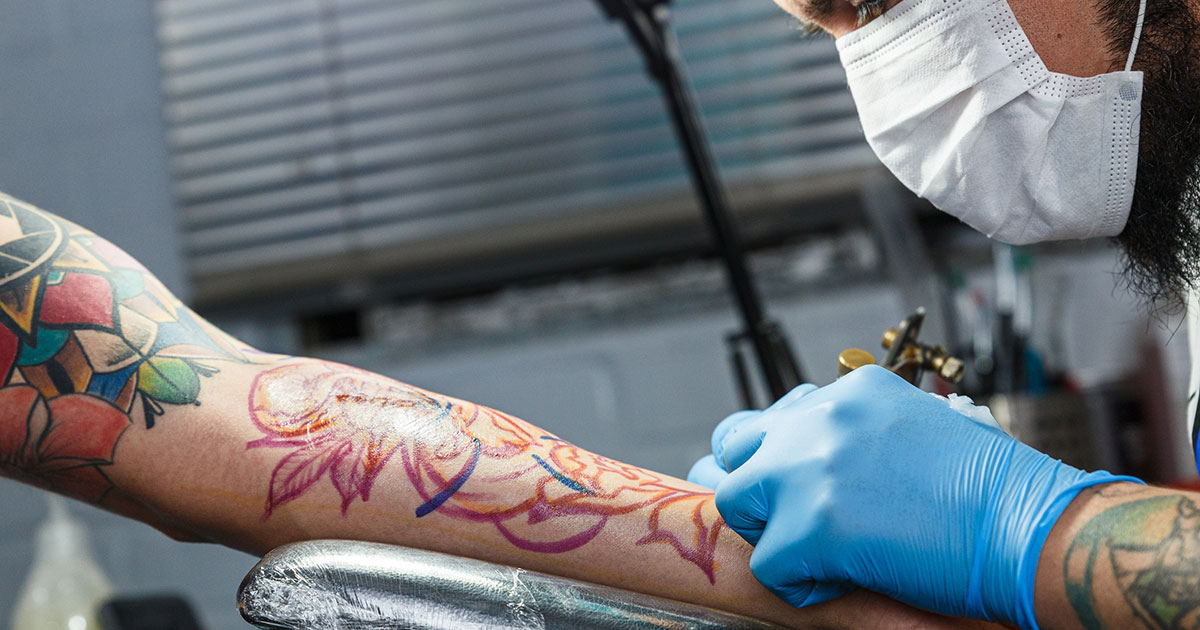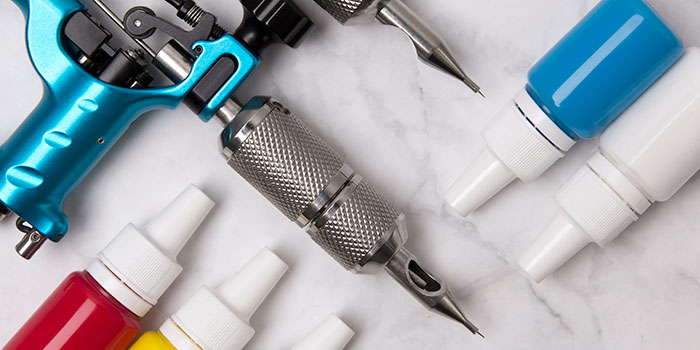
Tattooing is an ancient art form that’s developed into a revered process of permanently marking the skin with pigment as a way to show love, religious beliefs, military service, or to honor a loved one. The messages or images a tattoo artist creates with tiny ink droplets vary widely, but the significance is almost always personal.
Although tattoos have been traced all the way back to 3100 BC, they weren’t accepted as part of modern mainstream culture until the past decade or so. Before that, tattoos were often regarded as countercultural or fringe. Today, tattoos are not only accepted but desired by many, including cancer survivors looking for a way to celebrate the end of their battle with the disease.
With the popularity of tattoos rising, questions surrounding their safety have increased, as well. While tattoos are generally thought to be safe, research into the inks and ingredients used isn’t comprehensive, meaning they haven’t all been studied yet for their safety or role in cancer. Chemicals found in some tattoo ink may be toxic or carcinogenic (cancer-causing), for example. And having a tattoo may also make it harder to detect cancer on the skin.
Tattoos may also cause skin infections, allergic reactions and scarring, especially if you don’t see a licensed tattoo artist or if the tattoo hasn’t healed properly.
“Today, most places that offer tattoos are much more regulated than they used to be, so the risk of contracting conditions like hepatitis or infections is pretty darn small, thankfully,” says Anthony Perre, MD, FACP, New Patient Intake Physician at City of Hope, Atlanta.
Even though tattoos are considered safer than in the past, it’s still critical for cancer patients and survivors to consider when to get a tattoo and how to carefully choose a tattoo artist.
In this article, we’ll explore:
- How common tattoos are
- Tattoos and cancer risk
- Tattoos and infection risk
- Getting a tattoo to celebrate cancer survivorship
- Who shouldn’t get a tattoo?
- When is it safe to get a tattoo?
- How to choose a tattoo artist
If you’ve been diagnosed with cancer and would like to learn more about our treatment options, or if you’re interested in a second opinion about your cancer diagnosis and treatment plan, call us or chat online with a member of our team.
How common are tattoos?
If you look around and think you’re seeing more people with tattoos than you did in the past, you’re not wrong. According to a 2019 Ipsos poll, 30 percent of all Americans, regardless of age, have at least one tattoo. That’s a significant jump from 21 percent in 2012.
“If you look at most people in their 20s and 30s, I would say that a large proportion of young people have tattoos now,” Dr. Perre says. “So it’s become a whole different dynamic than it was 50 years ago.”
Data show that tattoos’ popularity accelerated during the 1990s and early 2000s, when they started appearing in movies and on TV. And then came social media, which transformed tattoos from a cultural taboo to an acceptable—even desirable—form of mainstream self-expression.
Further, a 2019 survey from Statista found that very few people cited employment as a reason to not get a tattoo, contrasting sharply with polls in the past that showed many people thought having a visible tattoo would prevent them from advancing in their career.
Tattoos and cancer risk
Getting a tattoo is, by itself, unlikely to cause cancer, but some risk may be tied to certain ingredients in tattoo ink.
Today’s inks typically contain water, glycerin and coloring pigments. But researchers have found they may also include other, more concerning substances, like shellac, preservatives, ammonia and nickel, as well as other heavy metals and contaminants. Many of these substances are considered potentially toxic or carcinogenic.
Earlier this year, a study found that almost half of all tattoo inks in the United States may contain carcinogens. The study, from State University of New York (SUNY) at Binghamton, analyzed 56 popular inks used by American tattoo artists and found that 23 of them contain azo dyes, which aren’t harmful when they’re chemically intact, but they may become carcinogenic if they’re exposed to bacteria or ultraviolet light and break down.
Research from 2018 found that tattoo ink contains nanoparticles—microscopic particles capable of traveling through the skin and into underlying blood vessels. Some evidence suggests these nanoparticles are linked to nerve damage and toxic effects on the brain. Research found nanoparticles from tattoo inks, especially black ink, in blood vessels throughout the body.
Researchers in Sweden have concluded that "tattoo exposure was associated with an increased risk of malignant lymphoma." And they have called for more research to determine potential causes.
Removing a tattoo doesn’t necessarily eliminate risks posed by these substances either. Tattoo removal uses pulsed lasers to break down the skin’s larger pigment particles, which may then get absorbed into the body.
Tattoo inks also aren’t regulated by the U.S. Food and Drug Administration (FDA). Even though they’re injected into the skin, they’re regulated as cosmetic products, not medical products. That means that while the FDA does monitor and issue reports on inks linked to infections or illness, it doesn’t have to approve them before they go to market.
Still, no definitive evidence has yet been found suggesting an increased risk of skin cancer from tattoos. In fact, research suggests that reports of skin cancer developing from tattoos may be mostly coincidental.

Tattoos and infection risk
Tattoos don’t typically cause major health problems, but they may raise infection risk. That’s why cancer patients with compromised immune systems should talk to their doctor about whether and when to get a tattoo.
The most common complications associated with tattoos are:
- Skin infections, especially staphylococcus aureus and streptococcus pyogenes
- Allergic contact dermatitis and granulomas, or inflammation that causes small bumps on the skin
- Keloids, or raised areas caused by an overgrowth of scar tissue.
Viral infections, such as HIV and hepatitis C from contaminated needles, are extremely rare but still possible—and these viruses are linked to an increased risk for different types of cancer.
Also rarely, tattoos may cause swelling or burning during a magnetic resonance imaging (MRI) procedure, and, in some cases, tattoo pigments may interfere with MRI image quality.
See your doctor if you experience an allergic reaction to the tattoo ink or if you develop an infection.
Getting a tattoo to celebrate cancer survivorship
Some survivors choose to commemorate their cancer battle with a tattoo. It’s a personal and symbolic gesture for these survivors, and they often incorporate a ribbon with the color associated with their cancer type in their tattoo. For instance, breast cancer patients may get a pink ribbon tattoo.
If you’re thinking about getting body art after treatment ends, you may want to consider a few things. For example, you’ll want to choose the tattoo’s location carefully. Do you want to give yourself the option to hide the tattoo under your clothes sometimes? Also remember that weight gain—including during pregnancy—may affect or distort the tattoo’s appearance.
If you’re a breast cancer survivor, you may want to get a tattoo to cover your mastectomy scars. In this case, talk with your tattoo artist beforehand to make sure he or she is comfortable tattooing over scar tissue. Scars can be challenging for some tattoo artists if they’re not familiar with them.
Who shouldn’t get a tattoo?
In general, anyone still recovering from the effects of cancer treatment or the disease itself should consider waiting before getting a tattoo. That means if you have surgical scars that are still healing or you’re in active chemotherapy or radiation therapy, it may be best to wait until your scars are healed and your treatment is complete. This is especially true for patients who have undergone radiation treatment, which slightly raises the risk of infection because it often causes fragile or damaged skin.
In addition, “if you have a compromised immune system, it’s best to hold off on getting a tattoo,” Dr. Perre says.
Side effects like lymphedema—common after breast cancer treatment, for example—may also raise your health risk from getting a tattoo. The procedure puts additional strain on the already lymphatic system with missing or damaged lymph nodes and the ink may react badly to skin damaged by the condition.
When is it safe to get a tattoo?
When you feel you’re ready for a tattoo after cancer treatment, have a conversation with your oncologist about whether your surgical incisions have healed and your body has recovered. “Once patients have gone through treatment and they’re a year or so past, then I think they can make a decision with their doctor about moving forward with a tattoo,” Dr. Perre says. You also may want to seek the advice of a dermatologist, who can perform a skin check and tell you whether the area of skin you’re considering for your tattoo has moles or other skin growths, which can be hidden by tattoos and make possible skin cancers hard to detect.
If you do have moles, avoid tattooing over them because that could camouflage possible cancer development or irritate the mole. You also shouldn’t get a tattoo over a melanoma scar so you can monitor it for any signs of recurrence.
How to choose a tattoo artist
One of the best ways to avoid health risks when getting a tattoo is by finding a licensed, reputable artist at a licensed tattoo parlor to perform the work.
Before getting the tattoo, talk to the artist about:
- His or her licensing and experience
- His or her sanitation practices (like sanitizing needles, for example)
- The inks used and their ingredients
- The type of equipment used
It really matters when you are considering getting a tattoo,” says Suji V. Mathew, MD, Infectious Disease Physician and Chief of Medicine at City of Hope Atlanta. “I would not get one while I am getting chemotherapy. If you want a tattoo make sure to pick the place carefully and they are using good aseptic techniques. And definitely do it when you are done with chemo make sure you are not immunocompromised.”
If you’ve been diagnosed with cancer and would like to learn more about our treatment options, or if you’re interested in a second opinion about your cancer diagnosis and treatment plan, call us or chat online with a member of our team.



